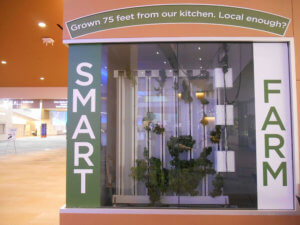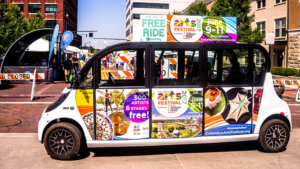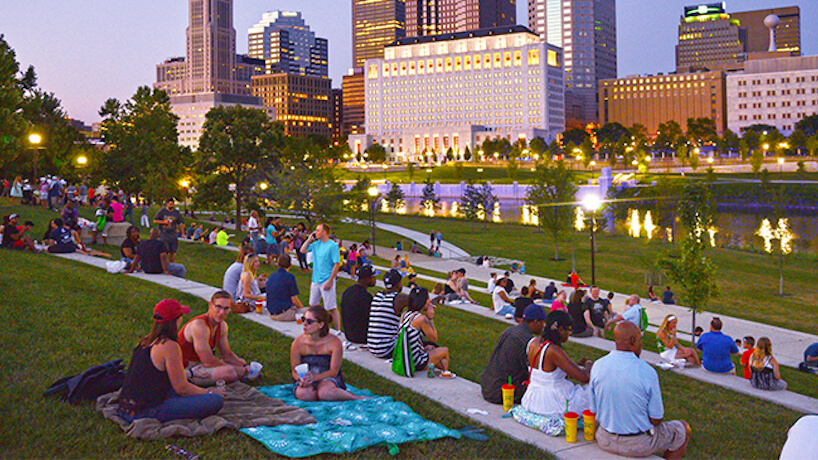When the Unitarian Universalist Association (UUA) held its annual General Assembly at the Greater Columbus Convention Center (GCCC) in 2016, it was important to UUA that they respect the seventh principle of Unitarianism, which is to show “respect for the interdependent web of all existence of which we are a part,” Janiece Sneegas, UUA’s director of General Assembly and conference services, told PCMA, “which calls on us to do sustainability work.” For the organization, this meant asking the conference center to implement its first-ever composting system and purchase carbon offsets, which help the property comply with caps on the total amount of carbon dioxide they’re allowed to emit. What UUA didn’t predict was the lasting impact that its event would have on the city of Columbus.
Many of the current initiatives were put in place after the UUA meeting, says Lexi Sweet, public relations manager for Experience Columbus, “but because their group met here, it really sparked a conversation about how we can be better, and the center has truly made it a priority during and since its recent renovation.”
 When the GCCC underwent a massive $140 million renovation and expansion, completed in 2017, sustainable features were incorporated, like “real-time energy monitoring” on all electric and natural gas meters, according to Ryan Thorpe, GCCC’s assistant general manager. This helps them “better measure and manage event energy use and the associated carbon footprint.” An integrated HVAC system regulates the heating and cooling systems of the center, and the entire building is monitored from one room, guaranteeing that unoccupied areas are not being heated or cooled.
When the GCCC underwent a massive $140 million renovation and expansion, completed in 2017, sustainable features were incorporated, like “real-time energy monitoring” on all electric and natural gas meters, according to Ryan Thorpe, GCCC’s assistant general manager. This helps them “better measure and manage event energy use and the associated carbon footprint.” An integrated HVAC system regulates the heating and cooling systems of the center, and the entire building is monitored from one room, guaranteeing that unoccupied areas are not being heated or cooled.
The standout feature of the venue’s renovation is the Discovery Café’s indoor, hydroponic vertical Smartfarm. Putting a new spin on farm-to-table, the Smartfarm produces more than 2.5 tons of produce per year, which is served throughout the center. “Visitors can see the plants we are growing,” Thorpe says, “and better understand the connection to the food they are consuming.” Meeting organizers can also personalize the experience for their events by consulting with Levy, the food-service provider for the GCCC, and the catering staff in advance to arrange for specific types of herbs and vegetables to be grown for their event — like fresh grown mint for mint juleps. And anything that isn’t used during meetings is donated to local charities.
 “GCCC has had a recycling program for many years but we recently purchased new recycling containers for the public spaces and the exhibit halls to expand the reach of our program and improve our results,” Thorpe explains. With a newly expanded single-stream recycling program, the GCCC allows attendees to discard all materials in the same containers, which will later be sorted by machines. “Our diversion rate is up nearly 10 percent over the same period last year, so we are seeing the results of the extra containers and effort.”
“GCCC has had a recycling program for many years but we recently purchased new recycling containers for the public spaces and the exhibit halls to expand the reach of our program and improve our results,” Thorpe explains. With a newly expanded single-stream recycling program, the GCCC allows attendees to discard all materials in the same containers, which will later be sorted by machines. “Our diversion rate is up nearly 10 percent over the same period last year, so we are seeing the results of the extra containers and effort.”
In addition to the recycling program, the center is decreasing its negative impact on the environment by incorporating Neptun induction lamps and LED lighting throughout the 1.8-million-square-foot facility. They produce the same amount of light as regular bulbs but use far less energy. And by monitoring what areas are occupied via motion detecting switches and a centralized light system, the GCCC ensures that occupied spaces are lit, while saving energy in unused spaces. This year, the meeting venue is in the process of pursuing LEED certification as they continue to research trends and best practices in the sustainability space.
“The commitment to sustainability in Columbus is amazing,” Thorpe says. “We host several events a year that challenge our existing programs to achieve new levels of sustainability for them, and we are always up to the challenge.”

